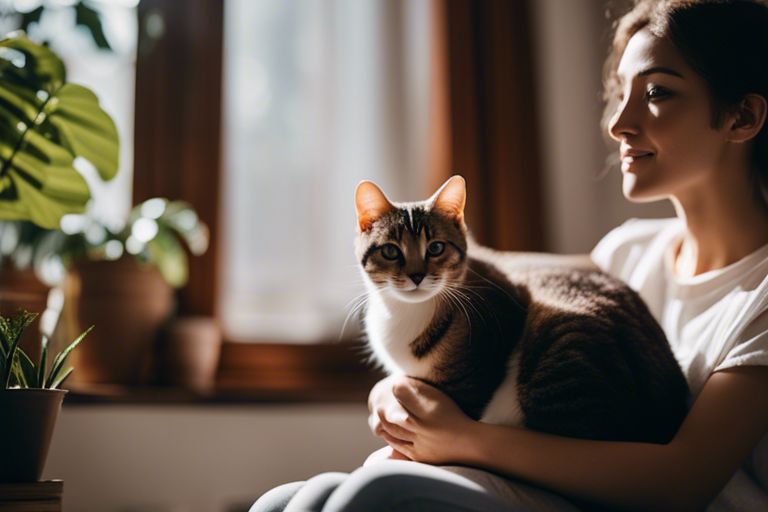Benefits of having a furry feline friend extend beyond cuddles and purrs; owning a cat can significantly improve your mental health.
Cats are known for their independent nature, which is perfect for providing companionship without being too demanding. Studies have shown that interacting with cats can lower stress levels, reduce feelings of loneliness, and decrease symptoms of anxiety and depression. The simple act of petting a cat can release calming chemicals in the brain, promoting relaxation and reducing negative emotions. Furthermore, the presence of a cat has been linked to lower blood pressure and decreased risk of heart attack and stroke. If you are looking for a natural way to boost your mood and overall well-being, owning a cat may be the purrfect solution.
The Soothing Purr of Comfort
Understanding the Calming Power of a Cat’s Purr
You may have noticed that when your feline friend curls up on your lap and starts to purr, there is an instant sense of calm that washes over you. This is because a cat’s purr has been scientifically proven to lower stress levels, reduce blood pressure, and promote relaxation. The frequency of a cat’s purr – between 25 and 150 Hertz – has a therapeutic effect on the human body, making it a natural stress reliever.
How Kitty Cuddles Can Lower Stress and Anxiety
When a cat snuggles up to you, it triggers the release of oxytocin, known as the “love hormone,” which helps reduce stress and anxiety levels. The act of petting a cat has been shown to decrease cortisol levels, a hormone associated with stress. Additionally, the rhythmic motion of a cat’s purr can have a meditative effect, promoting a sense of peace and well-being.
Understanding the profound impact that a cat’s purr and cuddles can have on your mental health can be a game-changer in managing daily stress and anxiety. Taking the time to bond with your feline companion not only strengthens your relationship but also provides you with a natural and effective way to unwind and relax.
Cats as Companions: Beyond the Myths
Any Effects of the characteristic temperament of cats on mental health have shown that the companionship of a cat can have numerous mental health benefits. Cats are often misunderstood as solitary animals, but they can form deep bonds with their human companions and provide emotional support in times of need.
Debunking the ‘Lone Wolf’ Cat Stereotypes
Many believe that cats are lone wolves who prefer to be independent and aloof. However, research shows that cats are social animals that enjoy companionship and can thrive in a loving relationship with their owners. Cats may have a reputation for being aloof, but they are capable of forming deep bonds with their human companions. The stereotype of the lone wolf cat is simply not accurate.
Building a Bond: How Relationships with Cats Enrich Our Lives
With Cats by our side, we experience unconditional love, comfort, and companionship that can significantly improve our mental well-being. Cats have a unique way of understanding their owners’ emotions and providing support when needed most. The relationships we build with our Cats are meaningful and rewarding, contributing to our overall happiness and well-being.
The Healing Whiskers: Therapeutic Benefits Unveiled
Despite the misconceptions surrounding cats as distant and aloof pets, research has shown that they offer a plethora of mental health benefits. According to 10 Mental Health Benefits of Owning a Cat, these feline friends have a remarkable impact on our well-being.
Feline Assistance in Coping with Depression and Loneliness
Therapeutic purrs and comforting cuddles from cats can be incredibly soothing for individuals struggling with depression and loneliness. Cats provide unconditional love and companionship, helping to reduce feelings of isolation and offering a sense of purpose to their owners.
The Role of Cats in Enhancing Mindfulness and Emotional Stability
With their calming presence and gentle demeanor, cats play a crucial role in enhancing mindfulness and emotional stability in their owners. Spending time with a cat can help individuals reduce stress, lower anxiety levels, and increase feelings of relaxation. Their playful antics and quiet purrs create a sense of peace and inner tranquility.
Paws for Thought: Practical Tips for Cat Ownership
After learning about the psychological benefits of owning a cat, you may be considering bringing one into your home. Here are some practical tips to help you make the most of your feline companion:
Ensure you have the right supplies: litter box, food, water bowls, scratching posts, and toys.
Regularly schedule veterinary check-ups to keep your cat healthy.
Provide a safe and comfortable environment for your cat to feel at home.
Spending quality time with your cat through play and cuddles can strengthen your bond.
The Psychological Benefits of Owning a Cat can be maximized when you incorporate these tips into your daily life with your furry friend.
Choosing the Right Cat for Your Lifestyle
Right from the start, it’s important to consider your lifestyle and living situation when choosing a cat. Whether you prefer a laid-back lap cat or an energetic playmate, selecting a cat whose personality matches yours can lead to a harmonious relationship.
Integrating a Cat into Your Daily Routine for Maximum Mental Health Benefits
For optimal mental health benefits, it’s crucial to integrate your cat into your daily routine. Plus, establishing a regular feeding schedule, interactive playtime, and designated cuddle sessions can create a sense of stability and companionship in your life.
Conclusion
With these considerations in mind, it’s clear that owning a cat can have numerous benefits for our mental health. From reducing stress and anxiety to providing companionship and boosting mood, the presence of a feline friend can truly make a positive impact on our well-being. So, if you’re looking for a furry companion to improve your mental health, consider adopting a cat and experience the love and support they can bring into your life.
source link eu news











